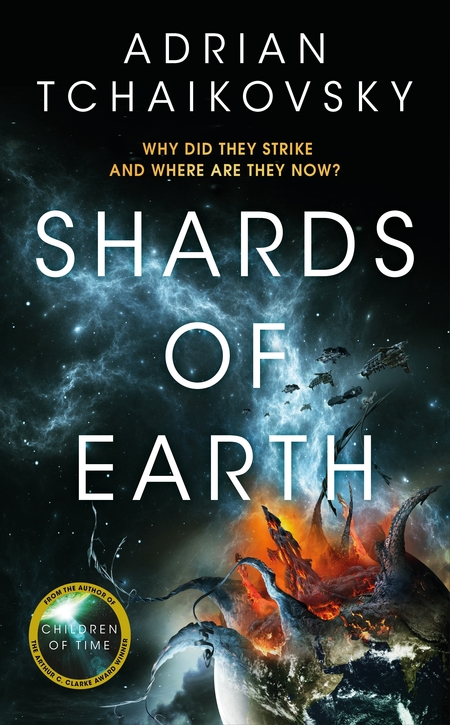In a world beset by a myriad of challenges right now, most notably COVID-19 and climate change, throwing yourself deep into the expansive surrounds of a brilliantly-written soap opera can be the panacea for a host of reality-driven ills.
If you feel the need for such a diversionary road, you should absolutely consider Adrian Tchaikovsky’s latest epic read, Shards of Earth, the first in the all-new Final Architecture series.
In every conceivable way, from premise to execution and beyond, Tchaikovsky has gone big in this compelling read, delivering monsters, death on a horribly immeasurable scale and war seemingly without end.
It is breathtaking to read but what really centres the story in some winningly grounded humanity is the author’s commitment to fine, deeply-etched and affecting characterisation which infuses a massive, sprawling narrative with a necessary intimacy which brings the unknowably large down to the movingly small.
Set well into the future when humanity has, as it is wont to do, colonised the stars in considerable numbers and with enviable success, Shards of Earth takes place in an interregnum between devastatingly destructive appearances by an alien species known only as the Architects.
Over approximately a century, humanity is engaged in a largely victory-less with the Architects, who are the size of small moons and can twist whole planets, killing everyone there instantly, into startlingly beautiful sculptures.
“He [Idris] froze. Strangers knowing his name was never auspicious, especially when it preceded an order and not an invitation. The voice wasn’t the nasal Roshu twang either, but something heavier with rolled consonants, from a planet less cosmopolitan than this.” (P. 45)
Their arrival in a particular system is always sudden and unannounced and humanity fails to both predict their appearances but also to come up with a way to fend them off and keep its far-flung colonies safe from harm.
While some research suggests that the ancient technology of the Originators is effective in dissuading the Architects from attack, no one in the human worlds collective known as Hugh is able to leverage a protective mechanism from it, with only the cultist authoritarian Essiel Hegemony, to which some human worlds have pledged allegiance in order to protect themselves, successful in developing a means of combating the alien threat.
Hugh could, of course, join with the Hegemony to gain access to the protective technology but that would entail a total loss of freedom and self-determination, something Hugh is simply not prepared to do, prefering instead to rely on the small ranks of the Intermediaries, cerebrally-manipulated humans who have the ability to speak to the Architects who are otherwise frustratingly unknowable.
That the Intermediaries, especially one named Idris, were successful in sending the Architects back to the void from whence they came, is the stuff of legend; what no one really appreciates, and which drives the narrative to a brilliantly propulsive degree, is the Architects are back and the clock is counting down to humanity’s possible extinction.
Thrillingly involved enough for you?

If not, throw in Hegemony gangsters, an Amazonian race of genetically-enhanced women called the Parthenon who proved integral to humanity’s survival in the first Architects-human war but who are now seen as seditious enemies of true humanity by far-right purists such as Nativists or the Betrayed (think QAnon but in futuristic space), governmental intrigue and a shipboard family of whom Idris is an inviolable part and you have, in Shards of Earth, an all-encompassing, richly emotive book which places intimate character focus at the heart of its dizzylingly grand narrative.
The world-building (and yes, world busting) alone is worth the price of admission.
Tchaikovsky, with an elegant but exciting economy, creates a universe in which multiple races and political systems are at play, where the various planets landed by Idris and the crew of the ship he calls home, the Vulture God, have startlingly imaginative cultures and ecologies and where the usual norms of human thought and expectation very rarely hold sway.
It’s a world, and this is used in a far more expansive way that just a single planet, in which all kinds of amazing things are possible but where a brutal self interest time and time again trumps any efforts at given the common good any kind of primacy.
By placing, Idris and his crewmates at the centre of the action, Hugh spacers who simply want to earn a living and have no interest in playing politics or mind games with anyone – the Intermediary in particular has retired from military action and simply wants to live a quiet life in what amounts to peace for the people of the galaxy – Tchaikovsky gives us in invaluable perspective on the actions, not only of the Architects but of Hugh, the Hegemony, the Parthenon and various alien allies, which brings Shards of Earth triumphantly alive.
“It’s what everyone will tell each other. That one fluke doesn’t mean they’re back. They’ll tell that to each other, and nobody will believe the news is true. He was trying to imagine the wave of panic spreading across the Colonies, once elusive rumour became hard evidence … Mass evacuations, worlds defecting pell-mell to the Hegemony, apocalyptic cults and survivalist brotherhoods and — yes — the goddamn Nativists would find a way to capitalize [sic] on it as well.” (P. 330)
This is space opera at its enthrallingly affecting best.
We are given epic, vast action sequences, intense battles for ships and planets, and political intrigue and criminal machinations that encompass so much time and space that they are a heady delight to behold and subsume yourself in.
But we are also given entrée into the hearts and souls of all kinds of people, granting a movingly human (and sometimes alien) dimensions to these big narrative strokes, such that even when something is expansively big, it still feels relatably and emotionally accessible.
Everything that happens matter in some fundamental way in this book; even when great battles result in untold numbers of deaths, there is always a profound sense that these are peoples’ lives we are talking about and that their loss is not simply the collateral damage of war but something vitally important, the impact of which is incalculably wrenching.
Shards of Earth is another stellar entry in Tchaikovsky’s ever more illustrious canon, a novel which dazzles you with stunningly limitless storytelling and compelling world building but which remembers how much the story of people matters and that big, amazing things only truly count if we are given insight into how people are affected by them.
You can tick all the space operatic boxes you want but unless we know how this matters to the characters and are given vivid evidence of that, it is all for naught; thankfully Tchaikovsky always the intimate and gargantuan with empathy, insight and humanity, gifting us in Shards of Earth with a story that stands up there with the very best of the genre.
